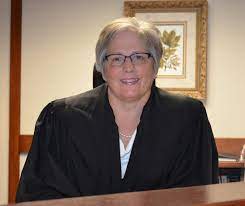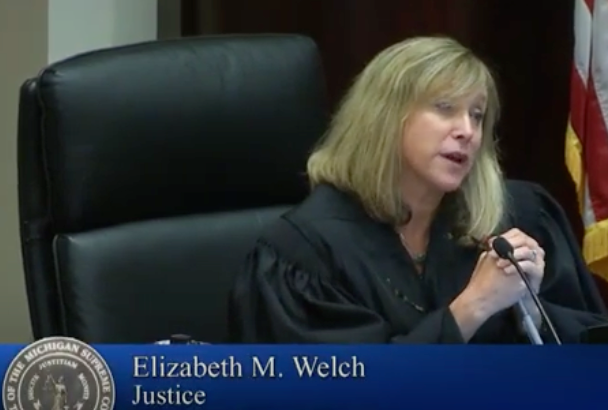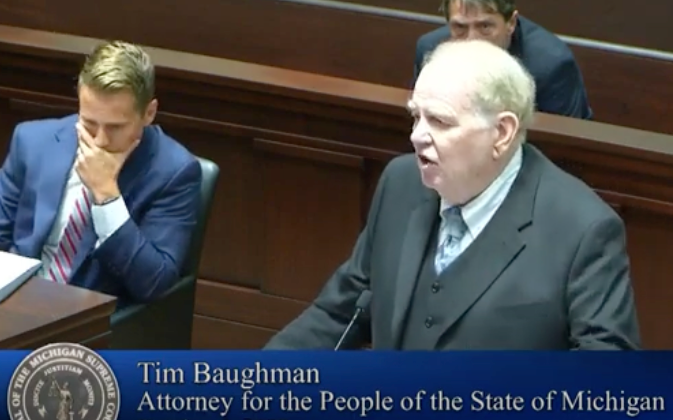Allegan County: Could a convicted criminal see a new trial after ex parte communications?
LANSING — Did an Allegan County judge's misconduct during a criminal trial affect the outcome of the case enough to warrant the defendant get a new trial?
On Oct. 5 — exactly one year after announcing it would hear the case — the Michigan Supreme Court heard arguments in the case of Daniel Loew, who is asking for a new trial after the discovery of communications between the judge and elected county prosecutor.
More: Michigan Supreme Court to decide if judge's emails compromised Allegan conviction
"At its heart, this case is about access," said defense attorney Heath Lynch. "Access to the thoughts and observations and decisional processes of the central figure in any criminal trial — the trial judge."
Lynch, people's attorney Tim Baughman and several of the justices all agreed the communications were inappropriate and were a violation of canon — a code of conduct for judges.
"I’m not trying to justify what the judge did here," said Justice David F. Viviano. "It appears to be a clear violation of the canon. The question is what are we to do about it?"
The case has volleyed around the higher court system after Loew's conviction in August 2019. He was convicted of five counts of criminal sexual misconduct and sentenced to at least 20 years in prison. The victim was 13 at the time of the first reported assault.
The emails were unearthed by Allegan-based attorney Michael Villar, who challenged Allegan County Prosecutor Myrene Koch's re-election bid in 2020.
The emails between Koch and Judge Margaret Bakker showed the two discussing the case while Loew's trial was occurring in Bakker's courtroom. Although Koch didn't directly prosecute the case for the county, she was the supervisor of the assistant prosecutor who did.
The case was tried by assistant prosecuting attorney Emily Jipp. Loew's attorney argued it's impossible to know whether Koch shared the communications with Jipp and whether trial strategy was altered due to what Bakker wrote in the emails.
Koch previously told The Sentinel she never discussed the emails with Jipp.

In November 2020, Allegan District Court Judge William Baillargeon's granted Loew's motion for a new trial, saying such one-sided communications, called ex parte communications, between the judge and prosecutor gave the appearance of impropriety.
In the emails, Bakker wrote to Koch: "This trooper didn’t do a very good investigation. Don’t they have detectives with MSP anymore?"
Koch responded, "They do but not typically for CSCs. This trooper has been given additional personal training since this investigation."
Bakker wrote back, "One more question ... this victim was not referred for a medical, do you know why?"
The two then exchanged several emails about the lack of a medical exam.
Generally, ex parte communications — between a judge and only one party in a legal matter — are prohibited by ethics codes for judges and attorneys because they can give an unfair advantage to one side.
"Maybe it wasn't the case, but it creates the appearance of coaching, or at least flagging, 'This is something you're going to need to address,' and that's my worry," Baillargeon said.
More: Allegan man says judge, prosecutor denied him a fair trial
However, the Michigan Court of Appeals reversed that decision in a split 2-1 opinion in January.
Justices Christopher Murray and Jane Markey were in the majority, saying the emails didn’t provide an advantage to the prosecution.
In the majority opinion, Murray wrote that, while the appeals court recognized the communications were ex parte, such communications "between a sitting judge and a prosecutor do not warrant a new trial so long as the communications focus on administrative or procedural (i.e. non-substantive) matters."
Dissenting Justice Michael Riordan said reasonable minds could conclude that Bakker was biased in favor of the prosecution.
Last year, the Michigan Supreme Court said it would hear the appeal, but would limit the scope to the ex parte communications between Bakker and Koch, whether they were administrative in nature and whether Loew is entitled to a new trial.
"It's a violation of due process," Lynch argued to the justices Oct. 5. “Due process is, at times, difficult to define, but we know what it concludes. Everyone is entitled to a fair trial. Everyone is entitled to an unbiased judge.”
"So is the main argument that there was bias?" asked Justice Elizabeth M. Welch.
"Those communications clearly create an appearance of impropriety that non-lawyers and lawyers alike can see," Lynch said. "When I’m talking about bias, I’m talking about a judge taking the opportunity to comment on the investigation during the course of trial, at a time when there was still an opportunity for a response on the part of the law enforcement officers — to rectify what she believed was a deficiency with the investigation where the law enforcement officers and the prosecutor had the ability to do something about it. That’s the issue."

"Ex parte is ex parte. You don’t do it. Any first-year law student knows that," said Justice Richard H. Bernstein.
"We think this is a case where the line needs to be drawn," Lynch said.
Baughman, who appeared on behalf of Koch, agreed that Bakker's actions were inappropriate, but said there was no evidence the outcome of the case was unduly influenced.
"I think everyone agrees the judge violated the canon by emailing the prosecutor and not disclosing that to the defense, but however you characterize that … the question becomes did it affect the judgment? Did it affect the case at all?" he said.
"But what was the point of asking the question at all?" Bernstein asked Baughman. "What was the intent of the judge?"

"To get the question answered," Baughman replied. "'Don’t they have detectives anymore?' There’s no indication that affected the prosecutor’s strategy. The closing argument was not expanded from the opening argument. … The judge didn’t say, 'Hey, tell your prosecutor to go find more.'"
Loew is currently free while awaiting the outcome of his appeal. An opinion is expected to be published soon.
Subscribe: Get unlimited access to our local coverage
The emails were made public by Villar during his run for prosecutor. He obtained them through a Freedom of Information Act request. Villar, a private practice attorney, later lost the election by a handful of votes.
After the emails were discovered, Villar said he filed complaints against Koch and Bakker with the Michigan Judicial Tenure Commission and Attorney Grievance Commission, respectively. The status of those grievances is unknown, as the merits of Loew's appeal are still pending.
AGC investigations are confidential, and investigations of the Judicial Tenure Commission only become public if the commission decides to proceed with a formal complaint against the judge, typically reserved for allegations of serious misconduct.
In January 2022, the Michigan Supreme Court announced Judge Roberts Kengis would replace Bakker in supervising the 48th Circuit Court. Bakker, who remains on the bench, served in the role for 11 years.
— Sarah Leach is editor of The Holland Sentinel. Contact her at sarah.leach@hollandsentinel.com or follow her on Twitter @SentinelLeach.
This article originally appeared on The Holland Sentinel: Allegan County: Could a convicted criminal see a new trial after ex parte communications?

